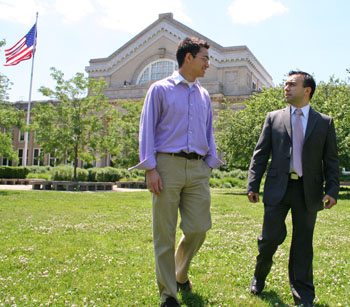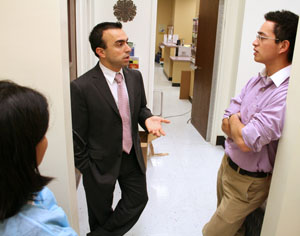|
Students Serve the Community through Heartland Alliance The skills and privileges physicians acquire as they learn and practice medicine put them in a unique position in society. They are allowed to hear the most intimate details of the lives of people they may have just met. Physicians are welcomed around the world when they volunteer their services to help humanity in times of natural disasters and tragedies brought by war, poverty, and disease. Feinberg School students have many opportunities to exercise such altruism, and the partnership between Heartland Alliance and the Department of Family Medicine add a great deal more.
Bechara Choucair, MD, executive director and medical director of Heartland International Health Center, an affiliate of Heartland Alliance, met Russell Robertson, MD, chair of the Department of Family Medicine at the Feinberg School, shortly after he was appointed in 2005. “Dr. Robertson wanted his department to be a hub of relationships with the community,” says Dr. Choucair, who joined the faculty as assistant professor of clinical family medicine the next year. “Heartland Alliance is a global human rights organization based in Chicago. One of the goals of our partnership with the Feinberg School is to provide service learning opportunities for medical students here and abroad.” For more than 100 years Heartland Alliance has addressed poverty issues, including providing health care, affordable housing, economic security services, and legal protections in Chicago and developing countries around the world such as Guatemala, Iraq, Lebanon, Nigeria, Rwanda, and Sri Lanka. In the Chicago area, Heartland Alliance owns more than 2,000 affordable housing units to help people move away from homelessness and near-homelessness. At various health care centers across the city, their physicians and volunteers provide primary care and mental health and dental care services for vulnerable groups such as refugees, new immigrants, homeless people, and those with HIV and AIDS. In a more recent initiative, Heartland Alliance has committed to improving school health care in partnership with the Chicago Public Schools (CPS). The organization established two new school health centers at Senn High School in Rogers Park and Roosevelt High School in Albany Park. Feinberg School student Matthew Tao learned about this endeavor from Elizabeth Ryan, EdD, assistant professor of family medicine and vice chair of education, who served as his first-year problem-based learning instructor. Dr. Ryan jointly supervises medical students’ summer internships with the department’s community partners. “She set up a meeting with Dr. Choucair to talk about the possibility of implementing sports medicine services at these two high schools,” explains Tao. “It’s not just about student-athletes and school-sponsored sports teams. The literature shows that nearly half of all orthopedic and soft-tissue injuries occur on playgrounds or inside the school. The idea is to make this a community outreach for kids who may be uninsured or otherwise can’t afford specialty care.” Nearly 85 percent of public school students come from low-income families, according to CPS. Tao says the concept is similar to an ongoing project launched by the medical student group, Action for Young Athletes in Chicago (AFYAC), in which Feinberg School students, residents, and physicians volunteer to provide pre-participation physicals for hundreds of CPS student-athletes. Tao participated in this year’s AFYAC program at Hanson Field near the Belmont Central neighborhood of Chicago.
A key component of any program will be educating children on exercise, injury prevention, and rehabilitation after injury. “Studies have shown that some kids who get hurt doing a particular activity will stop engaging in that activity,” Tao says. “With the obesity epidemic among children, we want to encourage kids to stay active in any way they enjoy.” Heartland Alliance chose Roosevelt and Senn as potential sites to pilot sports medicine programs in part because both large schools, enrollment 1,670 and 1,492 respectively, reflect the diversity of Chicago itself. At Senn, for example, students come from 49 countries and speak 75 different languages. A significant number of those students are new immigrants, which makes Heartland Alliance’s multicultural expertise especially applicable. “As part of the pilot program, Matt wants to give Feinberg students and physicians the opportunity to interact directly with student-athletes at both schools,” says Dr. Choucair. Dr. Choucair, who serves as program director of Global Health Education and Community Services in the Department of Family Medicine, welcomes all students who have interests in community service, whether here in Chicago or abroad. “We’re fortunate to have students with this level of sophistication, interest, and energy volunteering,” says Dr. Choucair. “The work they’re doing though Heartland Alliance and other community health programs is tremendous.” For more information on community health volunteering, other research opportunities, and global health experiences, visit Community Health Opportunities, the Department of Family Medicine’s Global Health and Community Services Program, Medical Student Summer Research Program, and Global Health Opportunities. |
Students Serve the Community through Heartland Alliance
By
–








